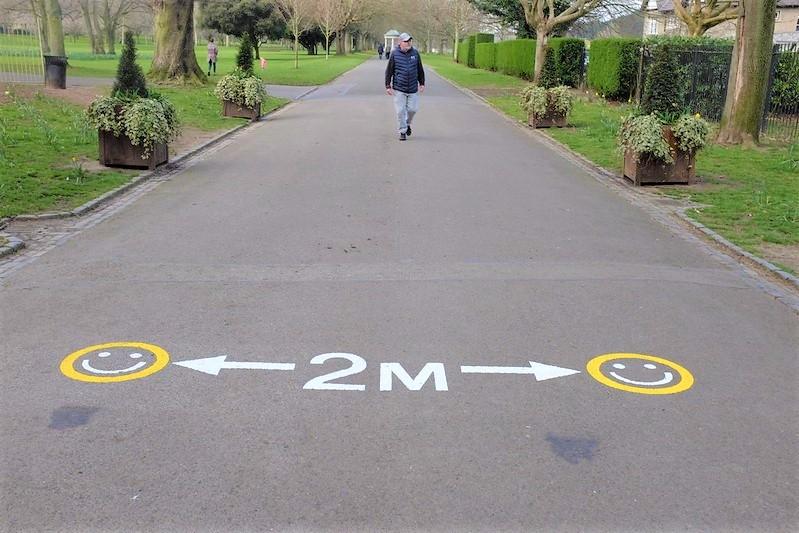With COVID-19 activity showing some early signs of stabilizing in parts of Europe, some governments are considering extending their lockdown orders, as cases are still surging or picking up in other parts of the continent.
Meanwhile, cases are accelerating in part of Asia, including Indonesia, Singapore, and Japan, and economic leaders are grappling with the pandemic's economic impact and how to fund the response.
The pandemic total reached 1,579,690 cases in 184 countries, along with 94,567 deaths, according to the Johns Hopkins online dashboard.
Economic fallout worst since Great Depression
Ahead of meetings next week with the World Bank, International Monetary Fund managing director Kristalina Georgieva today said the economic fallout from COVID-19 pandemic will be the worst since the Great Depression.
And she said that while governments have already spent $8 trillion to cushion the blow, she predicted that the world will see only partial recovery in 2021.
In another financial development, the board of the Global Fund to Fight AIDS, Tuberculosis, and Malaria today unanimously approved new COVID-19 response funding, which now totals $1 billion, targeting 54 countries. The group had earlier approved $500 million in grant flexibility, and today's action authorizes $500 million more.
European countries weigh lockdown extensions
In Italy, the number of new cases and deaths were both up again today, following a few days of downturns, a pattern typically seen as outbreak activity starts to stabilize. The country reported 4,202 new cases, up from 3,863 yesterday, along with 610 more deaths, up from 542 the previous day, Bloomberg News reported.
The nation's lockdown is set to expire Apr 13, but Prime Minister Giuseppe Conte is preparing to extend it for 2 more weeks, with the possibility that some companies and shops will be allowed to open, the report said.
Spain's parliament is debating a measure to extend the country's lockdown until Apr 26, the BBC reported. The country, the world's second worst-hit country, reported 683 deaths today, down from 757 the day before.
Both Belgium and the Netherlands are still seeing ongoing steady rises in COVID-19 cases, with each country again reporting more than 1,000 new cases today. The chair of Belgium's coronavirus science committee told Politico that the peak is starting to show. He noted that although Belgium has one of the highest per capita death rates in Europe, it is one of the few countries that includes out-of-hospital deaths in its totals.
The number of intensive care unit (ICU) patients is still increasing, and the country is worried about outbreaks in nursing homes. Army personnel have been brought in to support staff in two of them.
In the Netherlands, officials are also seeing early signs of stabilization in the number of hospitalized and ICU patients, Algemeen Dagblad, a newspaper based in Rotterdam, reported. The country's cases are concentrated in North Brabant and Limburg provinces in the south.
Cases spike in Turkey and Russia
Meanwhile, Turkey is reporting an ongoing surge of new cases, with 4,056 reported today. Cases have been on the rise for 10 consecutive days, Daily Sabah, a pro-government newspaper based in Turkey, reported. The country has curfews in place for people under 20 and those over age 65, and the country's health minister said most of the new cases are in people ages 20 to 65.
Russia today reported 1,459 new cases today, its biggest 1-day jump, raising the country's total to 10,131, and President Vladimir Putin announced that the nationwide "non-working week" measure has been extended until Apr 30 to slow the spread of the virus, the Moscow Times reported. Most of the country's illnesses have been reported from Moscow.
Indonesia, Singapore, Tokyo report record highs
Indonesia, the world's fourth-largest country, today reported its highest daily death and case totals, with 40 more deaths and 337 new illnesses, Reuters reported. Some experts have said the country has been slow to respond and hasn't issued major lockdowns, though it has given Jakarta officials more power to tackle the outbreak. The country has increased testing, but it has one of the lowest rates in the world.
Experts have also raised fears that travel to family homes at the end of Ramadan, a migration known as the "mudik," could spread the virus to other parts of the country.
Elsewhere, Singapore—battling a second wave of infections—also reported its biggest 1-day jump today with 287 new cases. The country's health ministry said 3 are imported cases, 217 are part of known clusters, and 19 are linked to earlier cases. Of the cases today, 202 are linked to clusters at foreign worker dormitories.
The country's cases today are more than double its previous daily high, Reuters reported, adding that thousands of foreign blue-collar workers live in dormitories across Singapore and make up a major part of its workforce in occupations ranging from construction to cleaning.
In Japan, where COVID-19 cases are steadily rising, Tokyo—the country's main hot spot—reported a record high 181 cases, Kyodo News reported. President Shinzo Abe declared a state of emergency on Apr 7 for Tokyo and six other prefectures, and some other prefectures have asked to be put on the list, which government experts are considering.




















